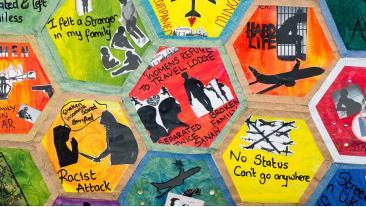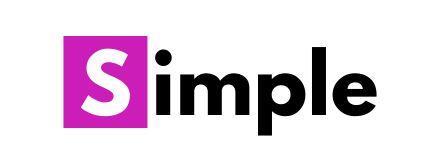
6 minute read
THE POWER OF ART
Definition of trauma applied in the project For the better and coherent understanding of trauma for SIMPLE project needs, we are going to use a very broad definition of trauma. Trauma is a psychological, emotional response to an event or an experience that is deeply distressing or disturbing. A traumatic event is an incident that causes physical, emotional, spiritual, or psychological harm. The person experiencing the distressing event may feel threatened, anxious, or frightened as a result. This trauma definition can refer to something upsetting, such as being involved in an accident, having an illness or injury, losing a loved one, going through a divorce or moved to another country. However, it can also encompass the far extreme and include experiences that are severely damaging, such as rape or torture. Because events are viewed subjectively, this broad trauma definition is more of a guideline (agreed by the partnership for the SIMPLE project scopes). Everyone processes a traumatic event differently because we all face them through the lens of prior experiences in our lives. Why non-verbal techniques?

Advertisement
The agents involved in the reception process reported that many of newcomers are not able to recognise the trauma when they arrive, additionally don’t speak the language of the host country. Non-verbal techniques can arrive where the words can’t and give many ways for non-verbal expression. The researchers agreed that for newcomers it is important to work with symbols, pictures in a way they can recognise and reproduce their trauma from a “dissociative” perspective.
Desk Research: practices collection
Objective: Give newcomers a face, create support, break through isolation, talent development, and contribute to trauma processing. To open eyes, to strengthen empathy and social cohesion, to make connections and to make people look at newcomers, at fellow humans in a different way. Practices were collected by using the template (ANNEX 1). The final version of the template was discussed and agreed during the kick - off meeting in Sweden (November 2019). The collection exercise took place in 6 partner countries: SWEDEN, ITALY, UK, THE NETHERLANDS, SPAIN, GERMANY in the timeframe between December 2019 and March 2020. In total, during the desk research activity 81 PRACTICES has been collected. Implementation of this activity involved the translation of the interview and the consent form into national languages (Spanish, Italian, German, Swedish and Dutch). Thanks to the research, the SIMPLE consortium identified alternative non-verbal tools, helpful in the elaboration and expression of past distressing events. The research focused on alternative therapies with the knowledge that they can act as catalysts for self-discovery and healing, which can help migrants to narrate their stories, describe past difficult events.


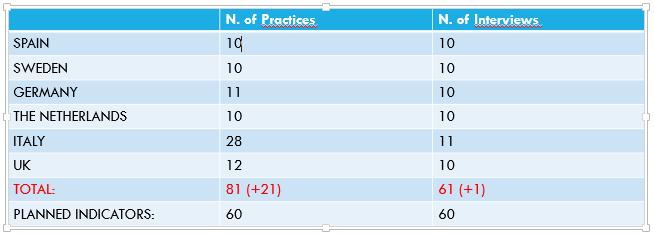
Filled practices tables were shared on the SIMPLE Google Drive, accessible by each member of the consortium under the following link: https://drive.google.com/drive/u/0/folders/1xRXCVlE_kMFwemQz5TCGDa417PZKhNkv Please note: Therapies Specific professional therapies applied to PTSD treatment has been mentioned in some of the national researches e.g. Cognitive-behavioural therapy, Eye Movement Desensitization and Reprocessing, Accelerated Experiential Dynamic Psychotherapy, but as not of the exact subject of the SIMPLE research are not included in the report.
ALTERNATIVE APPROACHES AS CATALYSTS FOR SELF-DISCOVERY AND HEALING
THE POWER OF ART
The research findings conclude that live arts, particularly performance, is an art form that facilitates AESTHETIC AND CATHARTIC EXPRESSION while at the same time constitutes political action.1
PROYECTA. VIDEO GALLERY The idea to find a tool that helps people who have gone through an experience with traumatic consequences using art. Art scenes will provide a picture of “your pain”. These scenes can help building an emancipatory narrative that may alleviate suffering. Aim: link an emotion with an image and explain why. STORIES OF MIGRANT WOMEN (“Gender, interculturality and coexistence” project) Short film made by Fundación Mujeres with the collaboration of participants in women's associations in Asturias and funded by the Asturian Agency for Development Cooperation, which takes a tour of the different situations that migrant women experience, with poems.
1
Research thesis: Towards recovery and bodily healing: violence based on action arts and creative arts: http://www.bdigital.unal.edu.co/6701/


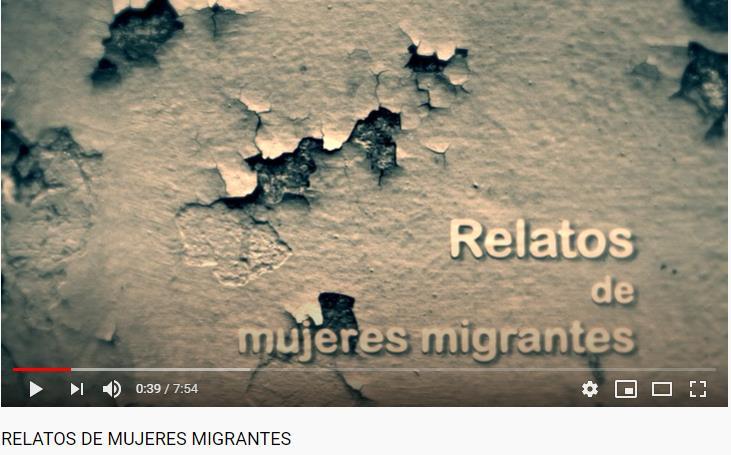
(https://www.youtube.com/watch?v=rNjX96DUzOc) FILM WORKSHOP WITHOUT AUTHOR. CEAR REFUGEES – a project that offers a group of refugees the experience of living and collectively managing a movie based on their own selection of images and the construction of a collective story. Applied approaches: grounded theory, defined by Strauss & Corbin (2002, p. 14). Constructivism and social constructionism, reflective methodology and ABR (Arts Based Research), checking the importance of the construction of new narratives in processes of inclusion and social transformation. Action-research: the knowledge emerges from the action and reflection on action (practice) produces knowledge; such knowledge is potentially transformative. - As a research tool and as a method to transmit the collected data. MOVING PEOPLE BY POWER OF ART HOUSE Art project: 10.010 mini-refugees all over Amsterdam and The Hague. On park benches, at stations, at traffic lights, along the canals, in the zoo, in front of various ministries, in the train. Power of Art House wants to give these stories, these people, a human face. By telling their stories and opening eyes. Making connections and showing people a different way of looking at refugees. Encouraging empathy and strengthening social cohesion. Not to blame or shame or judge, but to show the human suffering in the stories of each and every refugee. Ten people were found to share their stories through various social media channels and refugee organizations. People who have ever had to flee themselves. They were then scanned in 3D. The themes, memories, events and feelings that emerged in their stories were visually translated in their pose. https://www.power-of-art.nl/campaigns/moving-people/?lang=en


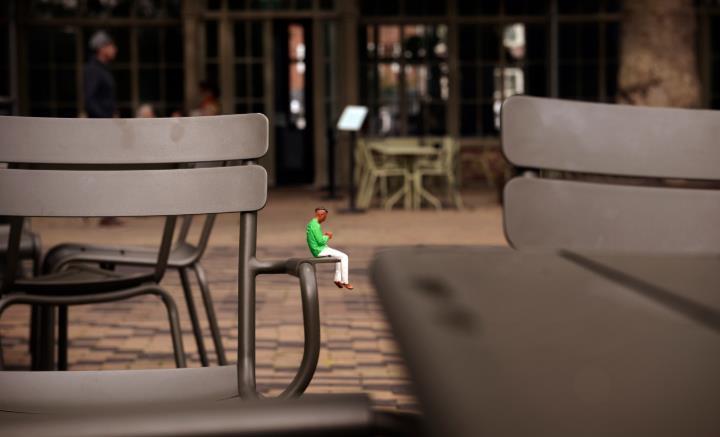
ARTCONNECTS - EMPOWERING COMMUNITIES Migration Blanket project - women’s stories across the world was presented during the Venice Biennale International Art Exhibition: ARTconnects - Empowering Communities, Venice, Italy. THE ART EXHIBITION IS
EXPLORING THE STRUGGLES, HOPES AND DREAMS OF MIGRANT WOMEN THROUGH ART. THIS PROJECT GIVES A WAY TO EXPRESS FEELINGS WHEN IT’S JUST TOO PAINFUL TO SPEAK ABOUT WHAT I’VE BEEN THROUGH.
ARTconnects™ workshops are aimed at empowering communities with workshops held in Birmingham, London and Norwich in the UK, Greece, Paris, Dubai and at the Venice Biennale-2019. These unique workshops are led by Salma Zulfiqar and promote women empowerment, cultural connections and work towards preventing hate crimes and extremism.
PLATFORMA ARTS + REFUGEES NETWORK: https://www.platforma.org.uk/routes-to-peace/ Platforma arts and refugee network supports and develops arts by, about and with refugees and migrants. It brings together groups and artists / performers of any background or political status (e.g. refugees and nonrefugees), whose work examines the varied experiences of refugees both before and after they arrived and settled in their host country. Supported by Art Council England.
